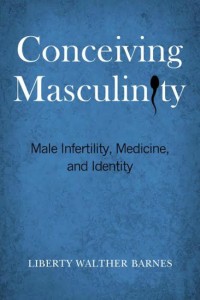Addressing the typically taboo topic of male fertility, Latter-day Saint ethnographer and sociologist Liberty Walther Barnes suggests abolishing gender stereotypes to encourage and increase medical breakthroughs.
Liberty Walther Barnes, who holds a Ph.D. and M.A. degrees in Sociology from the University of California at San Diego and a B.A. in Media Arts from Brigham Young University, is now a Research Associate in the Department of Sociology at the University of Cambridge.
She began conducting an ethnographic study of male infertility among heterosexual couples in the United States in 2007. She shadowed medical professionals in fertility clinics and followed up with couples receiving treatments from the clinics. Her resulting findings formed the basis for her book Conceiving Masculinity: Male Infertility, Medicine, and Identity.
Liberty discovered that male infertility often goes undiagnosed, or undetected, because of the prevailing belief that infertility is a woman’s issue.
Medicalnewstoday.com quoted Liberty Barnes’ comparison of cultural gender involvement ,
“In our culture, reproduction is women’s work. That work includes everything from conception to pregnancy, childbirth to breastfeeding. Infertility support groups, online chat groups, books, websites and blogs are led by women, written by women and geared toward women. Men are missing from our collective imagination and social dialogue when it comes to infertility.”
Not Even Discussing the Possibility of Male Infertility for My Family
Her thoughts definitely resonated with me. During my family’s infertility journey, I asked the doctor if he planned to test my husband. He said there was no need to test Anthony.
After 6 years of no evident cause of my infertility, my general practitioner ordered tests for Anthony, and felt the results warranted further investigation. I took the tests to our latest fertility specialist, who dismissed the findings as “Inconclusive. He probably had a cold when the tests were taken.”
And, that was the end of Anthony’s medical testing to even determine if he was fertile or not. After several years, my fertility regime became so intense and my hormones so totally whacked that taking drugs and shots for In-Vitro Fertilization (IVF) made me feel violent.
My poor husband traversed that time with love and careful patience. One day at work during a lucid moment, I decided that killing or maiming the father of the baby I was trying to conceive would subvert my intentions for a family. I immediately stopped the treatments and we never looked back.
But, I have wondered, if there was actually a different answer for our situation than shoveling drugs down my throat and shots everywhere else.
Is Male Infertility Unmanly?
Throughout her study, Liberty observed the cultural response to this question and concluded that while most infertile men “understood that in the broader culture male infertility is considered unmanly, they carefully thought about their particular diagnosis and were able to make sense of it in terms that preserved their sense of masculinity.”
As a broader community, “we presume infertile men are suffering deep anguish, but the truth is, male infertility makes everyone feel uncomfortable. Doctors, wives, families, the media, and everyday folk feel compelled to protect men from a crisis of masculinity like male infertility.”
Liberty told ABC News that doctors
“measure every step to protect these men’s masculinity. They don’t want them to be humiliated so they try to make a patient feel better.”
Two thirds of male patients don’t know they’re sterile because doctors use confusing language when diagnosing infertility rather than giving the facts, said Barnes. They use metaphors like “engines” and “baseball,” she added.
According to Barnes, one doctor referred to the testicles as a “factory” and the vas deferens as a “bridge.”
“Men recruited for the study met the clinical definition, but they didn’t understand they were infertile — even men with zero sperm count.”
Is Gender Stifling Scientific Imagination?
Women’s access to infertility treatment is straightforward and defined. Yet, treatment for male infertility is still quite ambiguous and a bit cryptic.
“As a result, men do not always know where to find the proper channels for help with their infertility issues.
Some men are happy to pursue IVF each time they want a child, but others would very much like to fix their fertility problems so that they can impregnate their partners themselves.
These men find the medical system very frustrating and unsympathetic to their needs.”
In a recent Tedx Talk, Liberty questioned, “Is it possible gender is stifling our collective scientific imagination? Should we be imagining bigger? … Scientific progress relies on social progress. … It is time to broaden our sociological imagination so that our scientific imagination has room to stretch and grow. Let’s let our scientific imaginations run wild.”
About Delisa Hargrove
I am a member of The Church of Jesus Christ of Latter-day Saints. I have moved 64 times and have not tired of experiencing this beautiful earth! I love the people, languages, histories/anthropologies, & especially religious cultures of the world. My life long passion is the study & searching out of religious symbolism, specifically related to ancient & modern temples. My husband Anthony and I love our bulldog Stig, adventures, traveling, movies, motorcycling, and time with friends and family.





